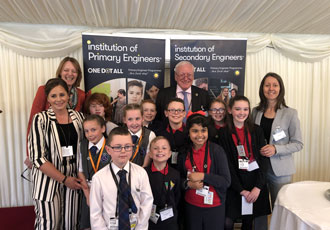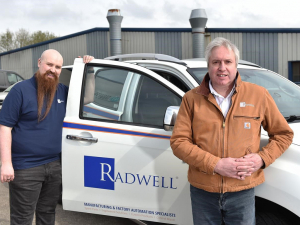Engineers in the making find a home in new institutions for children

A fifteen year mission to bring engineering into primary classrooms has taken its most ambitious step yet as Primary Engineer officially launches - The Institution of Primary Engineers and The Institution of Secondary Engineers today. Both Institutions have been built for the digital age and are set to change the way skills are taught and nurtured in schools.
They will help provide the foundation to challenge the widening engineering skills-gap and improve school pupils’ career pathways and employability through close collaboration with pupils, educators, industry, the STEM community, and parents.
Dr Susan Scurlock, MBE, Founder of Primary Engineer and creator of the two Institutions said: “The primary school children of today will, within the next quarter of a century, be the original thinkers, problem solvers, and collaborators that change the world. The Institutions of Primary and Secondary Engineers will empower children to navigate a pathway to work while identifying, building and supporting engineers in the making. This is the beginning of a cycle that will embed fundamental skills in children from a very young age providing them with the foundation for their and our future.”
The two Institutions have been designed to help pupils and teachers structure skills, both personal and those closely related to engineering, and the wider STEM curriculum continuously throughout a pupil’s educational journey. Delivered via an online portal they allow teachers to create, access and evaluate projects while keeping track of the skills their school delivers.
Professor John Perkins CBE FREng, Author of The Perkins Review of Engineering Skills said at the launch: “The Institutions will provide the framework for bringing together STEM initiatives and education into a single, cohesive journey for children that will track and celebrate their progress as they move through the education system. Too often, young people’s experience of STEM related activities, either as part of the curriculum in schools, or through outreach by industry or voluntary organisations, feels patchy and a little random. The Institutions are designed to provide a coherent structure to help overcome this problem.”
The structure of the Institutions revolves around an on-going partnership with industry sectors, educators and the STEM universe. Early adopters from the Energy and Utilities Sector EU Skills UK and from industry with WEIR Group, demonstrate a commitment to nurturing skills early-on as a vital and necessary investment in the future of their industries.
Nick Ellins, Chief Executive of Energy & Utility Skills Group said: “It is my pleasure to announce a partnership between Energy & Utility Skills and Primary Engineer. Our organisations are fully committed to helping school children to engage with engineering in fresh and innovative ways, and to connect them with employers that will truly value and nurture their abilities for the future.”
“The utility sector has engineering in its very DNA, and that means an engineering mind set and not only mechanical tasks. The employers in gas, power, water and waste management serve 66 million people with complex environmental infrastructure and essential services every day. What they do underpins our very society.
Helping school children at an early age to build that passion for helping others through engineering excellence is a core part of our Energy & Utilities skills strategy, and we are committed to helping the Institution of Primary Engineers and Institution of Secondary Engineers as they help society by growing the next generations of diverse talent.“
With the UK facing a skills crisis across many sectors, forming a steady bedrock of professional skills formulated around engineering can only be a good thing. It is widely recognised that engineering skills are highly transferable and therefore can underpin a wide range of career paths and destinations. The importance of encouraging the next generation of engineers, data scientists, and other professions from a young age has never been more acute. Moreover, in an age of transformation that will have a dramatic effect on the future job market, the skills that best serve the future workforce are those which require a project-based skills approach, including problem-finding, problem-solving, systems thinking and implementation skills.
Primary Engineer is a proponent of projects that bring together industry, teachers and pupils throughout the UK, and engages with over 60,000 pupils annually through its various programmes. For Dr Scurlock, the ambition to combine curriculum experiences with extra-curricular and outside of school experiences into a cohesive structure that allows students to continue to feed their enthusiasm for learning throughout their own education, is the final piece of the STEM puzzle.
“With an open, inclusive, practical approach, the institutions can become the backbone of skills-based STEM education in the UK. Now the real work begins, and we are calling for teachers, pupils and industry to get behind the Institutions and help us make them a platform to an exciting career that all pupils deserve” added Dr Scurlock.
Similar articles
More from Primary Engineer
- The Institution of Primary Engineer welcomes its first Honorary fellow 5th June 2019
- Engineers in the making find a home in new institutions for children 20th May 2019
- New competition seeks engineers of the future 1st March 2019
- Primary school secures place on national engineering pilot programme 20th February 2019












Write a comment
No comments